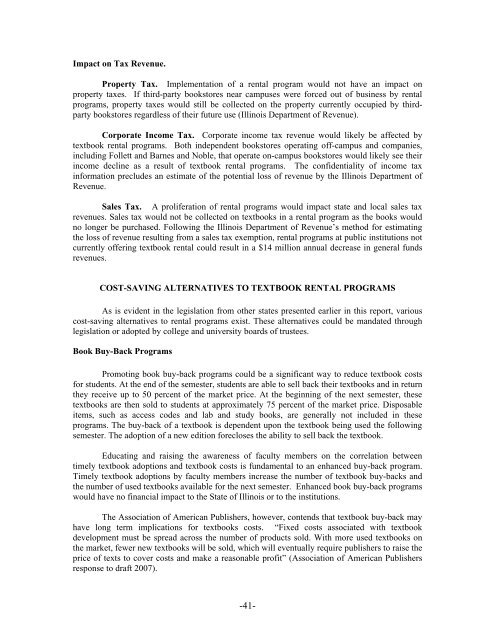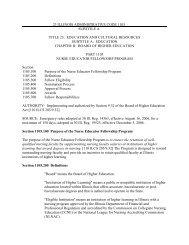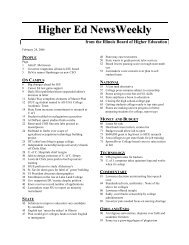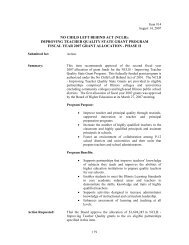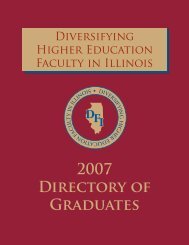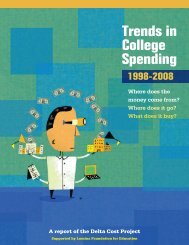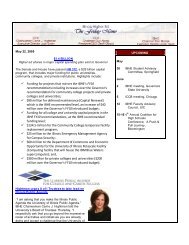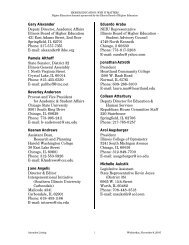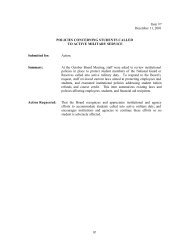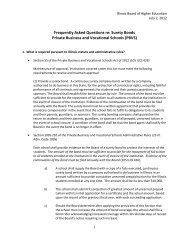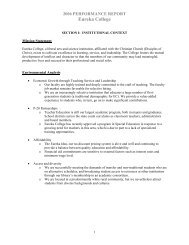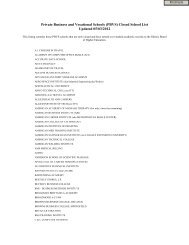A Report on the Feasibility of Textbook Rental - IBHE
A Report on the Feasibility of Textbook Rental - IBHE
A Report on the Feasibility of Textbook Rental - IBHE
You also want an ePaper? Increase the reach of your titles
YUMPU automatically turns print PDFs into web optimized ePapers that Google loves.
Impact <strong>on</strong> Tax Revenue.Property Tax. Implementati<strong>on</strong> <strong>of</strong> a rental program would not have an impact <strong>on</strong>property taxes. If third-party bookstores near campuses were forced out <strong>of</strong> business by rentalprograms, property taxes would still be collected <strong>on</strong> <strong>the</strong> property currently occupied by thirdpartybookstores regardless <strong>of</strong> <strong>the</strong>ir future use (Illinois Department <strong>of</strong> Revenue).Corporate Income Tax. Corporate income tax revenue would likely be affected bytextbook rental programs. Both independent bookstores operating <strong>of</strong>f-campus and companies,including Follett and Barnes and Noble, that operate <strong>on</strong>-campus bookstores would likely see <strong>the</strong>irincome decline as a result <strong>of</strong> textbook rental programs. The c<strong>on</strong>fidentiality <strong>of</strong> income taxinformati<strong>on</strong> precludes an estimate <strong>of</strong> <strong>the</strong> potential loss <strong>of</strong> revenue by <strong>the</strong> Illinois Department <strong>of</strong>Revenue.Sales Tax. A proliferati<strong>on</strong> <strong>of</strong> rental programs would impact state and local sales taxrevenues. Sales tax would not be collected <strong>on</strong> textbooks in a rental program as <strong>the</strong> books wouldno l<strong>on</strong>ger be purchased. Following <strong>the</strong> Illinois Department <strong>of</strong> Revenue’s method for estimating<strong>the</strong> loss <strong>of</strong> revenue resulting from a sales tax exempti<strong>on</strong>, rental programs at public instituti<strong>on</strong>s notcurrently <strong>of</strong>fering textbook rental could result in a $14 milli<strong>on</strong> annual decrease in general fundsrevenues.COST-SAVING ALTERNATIVES TO TEXTBOOK RENTAL PROGRAMSAs is evident in <strong>the</strong> legislati<strong>on</strong> from o<strong>the</strong>r states presented earlier in this report, variouscost-saving alternatives to rental programs exist. These alternatives could be mandated throughlegislati<strong>on</strong> or adopted by college and university boards <strong>of</strong> trustees.Book Buy-Back ProgramsPromoting book buy-back programs could be a significant way to reduce textbook costsfor students. At <strong>the</strong> end <strong>of</strong> <strong>the</strong> semester, students are able to sell back <strong>the</strong>ir textbooks and in return<strong>the</strong>y receive up to 50 percent <strong>of</strong> <strong>the</strong> market price. At <strong>the</strong> beginning <strong>of</strong> <strong>the</strong> next semester, <strong>the</strong>setextbooks are <strong>the</strong>n sold to students at approximately 75 percent <strong>of</strong> <strong>the</strong> market price. Disposableitems, such as access codes and lab and study books, are generally not included in <strong>the</strong>seprograms. The buy-back <strong>of</strong> a textbook is dependent up<strong>on</strong> <strong>the</strong> textbook being used <strong>the</strong> followingsemester. The adopti<strong>on</strong> <strong>of</strong> a new editi<strong>on</strong> forecloses <strong>the</strong> ability to sell back <strong>the</strong> textbook.Educating and raising <strong>the</strong> awareness <strong>of</strong> faculty members <strong>on</strong> <strong>the</strong> correlati<strong>on</strong> betweentimely textbook adopti<strong>on</strong>s and textbook costs is fundamental to an enhanced buy-back program.Timely textbook adopti<strong>on</strong>s by faculty members increase <strong>the</strong> number <strong>of</strong> textbook buy-backs and<strong>the</strong> number <strong>of</strong> used textbooks available for <strong>the</strong> next semester. Enhanced book buy-back programswould have no financial impact to <strong>the</strong> State <strong>of</strong> Illinois or to <strong>the</strong> instituti<strong>on</strong>s.The Associati<strong>on</strong> <strong>of</strong> American Publishers, however, c<strong>on</strong>tends that textbook buy-back mayhave l<strong>on</strong>g term implicati<strong>on</strong>s for textbooks costs. “Fixed costs associated with textbookdevelopment must be spread across <strong>the</strong> number <strong>of</strong> products sold. With more used textbooks <strong>on</strong><strong>the</strong> market, fewer new textbooks will be sold, which will eventually require publishers to raise <strong>the</strong>price <strong>of</strong> texts to cover costs and make a reas<strong>on</strong>able pr<strong>of</strong>it” (Associati<strong>on</strong> <strong>of</strong> American Publishersresp<strong>on</strong>se to draft 2007).-41-


